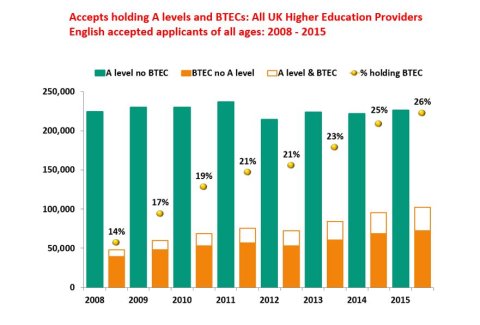Less than two-thirds (63%) of UK 18 year olds applied to higher education last year studying the traditional set of three A levels, and in England A Levels themselves are changing.
While the A level remains the most successful route into the most competitive academic courses, over a quarter (26%) of English students accepted to higher education in 2015 held at least one BTEC in their set of qualifications.

UCAS’ Progression Pathways project gives a comprehensive picture of the skills and knowledge offered by different qualifications and examines the extent to which they can prepare students for higher education.
It also looks at how schools, universities and colleges can help young people choose between an academic, vocational or mixed portfolio of qualifications.
In England the introduction of Tech levels, and reforms like the ‘de-coupling’ of the AS from the A level mean students are applying to HE with an ever greater diversity of qualifications. In Scotland around 25-30% of learners are now studying for HNC/HND qualifications which come with a guarantee that students can go on to a full degree, if they wish.
With this in mind, UCAS has developed a range of information and advice (including videos from education sector experts) for students, parents, schools and universities, to help identify appropriate progression pathways.
The report recommendations for schools and universities include:
- Developing a complete understanding of the difference between the various qualification pathways and the implications for HE progression
- Setting clearer higher education entry requirements to secure the right match between student and course
- While some universities have transition programmes in place, more will be needed as the number of students with less traditional qualifications or from less traditional routes increases
- Building partnerships between higher education and key feeder schools and colleges to develop a shared understanding of the qualification pathways
Mary Curnock Cook, UCAS Chief Executive said: “The increasing popularity of non-A level options for progression to HE makes this a timely report.
“It will help admissions professionals to understand the wide range of curriculum and assessment approaches behind an increasingly complex qualifications landscape.”
James Kewin, Deputy Chief Executive of Sixth Form Colleges Association said: “Although Sixth Form Colleges deliver around one fifth of the A levels sat in England each year, BTECs are growing in popularity. Our latest analysis shows that 88% of Sixth Form Colleges are now offering BTEC qualifications.
“Study programmes that combine BTEC and A level qualifications are becoming increasingly common and have proved to be a highly effective way of helping young people to progress to higher education and employment. Overall, we think the take up of applied general qualifications and the new Tech levels is likely to increase as schools and colleges adapt to the introduction of the new style A levels.”
Paul Teulon, Director of Admissions and Registry Services at King’s College London said: “It is crucial that universities have a good understanding of the structure, content, examination method, grades and grading distributions for all qualifications which they accept. At King’s last year we reviewed the performance of our BTEC students on programme and this lead to a strengthening of our entry requirements, which now focus more on the number of units at distinction level, rather than the overall grade.”
The full set of UCAS’ Progression Pathways resources including the report, advice videos and student case-studies can be found here.
Ends
About UCAS
UCAS, the Universities and Colleges Admissions Service, is a charity and the UK's shared admissions service for higher education. We manage applications from around 700,000 people each year for full-time undergraduate courses at over 370 providers across the UK.
UCAS Press Office contacts:
ENDS